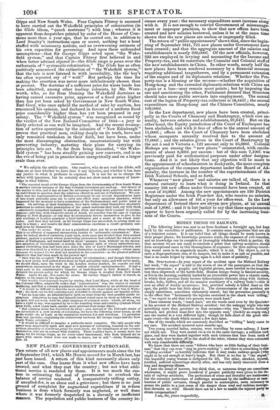NEW PLACES : GOVERNMENT PATRONAGE.
THE return of all new places and appointments made since the 1st of September 1841, which Mr. Hawes moved for in March last, has just been issued. A return of this kind necessarily shows only part of the case. One learns from it what new offices have been created, and what they cost the country ; but not what addi- tional service is rendered by them. It is too much the cus- tom in estimating the cost of government to overlook the balance of service rendered. A comparatively trifling outlay, if uncalled-for, is an abuse and a grievance ; but there is no just ground of complaint for augmented expenditure if in return business is done which formerly was neglected, or well done Where it was formerly despatched in a slovenly or inefficient =miler. The population and public business of the country in- crease every year the necessary expenditure must increase along i with it. It is not enough to convict Government of mismanage- ment or improper practices, to show that new offices have been created and new salaries bestowed, unless it be at the same time shown that the new places are useless or improperly filled. The return of " public appointments" shows that since the begin- ning of September 1841, 725 new places under Government have been created ; and that the aggregate amount of the salaries and establishments is nearly 326,0001. Of the new officials, however, 233 are employed in levying and accounting for the Income and Property-tax, and 64 constitute the Consular and Colonial staff of the new establishments in China. In other words, nearly half the new places have been rendered necessary by a financial measure requiring additional taxgatherers, and by a permanent extension of the empire and of its diplomatic relations. Whether the Pro. perty-tax is a blessing or the reverse—whether the acquisition of Hong-kong and the extended diplomatic relations with China are a gain or a loss—may remain moot points decreed but by imposing the one and sanctioning the other, Parliament decreed that Ministers should take more public servants into employment. The annual cost of the legion of Property-tax collectors is 58,4421.; the annual expenditure on Hong-kong and the Chinese Consulates, nearly 109,000/. In the Law department, new places have been created, princi- pally in the Courts of Chancery and Bankruptcy, which cost an- nually, between salaries and establishments, 97,6471. But on the other hand, the Equity jurisdiction of the Court of Exchequer has been abolished, and with it fees of office to the annual amount of 11,0001.; offices in the Court of Chancery have been abolished whose occupants annually received fees to the amount of 77,000/. ; and the salaries given in the Court of Bankruptcy by the act 5 and 6 Victoria c. 122 amount only to 35,8901. Colonial Bishops are among the " new places " enumerated, with emolu- ments of about 8,3001. per annum : but of this sum 7,1001. was previously paid for ecclesiastical purposes under other designa- tions. And it is not likely that any objection will be made to the appointment of schoolmasters in dockyards, the more complete organization of the compass department under the Board of Ad.. miralty, the increase in the number of the superintendents of the Irish National Schools, and so forth. Whenever "new places " and salaries are talked of, there is a natural curiosity to learn what is doing in Ireland. In that country 188 new offices under Government have been created, at a cost of 10,0621. Among the new appointments are 130 District Registrars under the Irish Poor-law Act, who receive no salaries, but only an allowance of 10/. a year for office-rent. In the Law department of Ireland there are eleven new
-"--- pascanntfl_ usticilc saytaEt these appointments appear to have been urgently called for by the increasing busi- ness of the Courts.


























 Previous page
Previous page